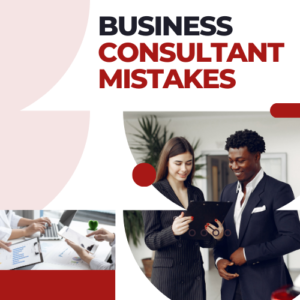Consulting has become an integral part of business strategy across industries. Organizations often seek consultants’ expertise to provide fresh perspectives, solve specific problems, or guide complex transformations. However, the initial excitement of bringing in external expertise can quickly dissipate if a company mishandles the consulting process. Here, we delve into the common mistakes companies make after hiring consultants and how to avoid them to ensure a successful partnership and a fruitful outcome.
Lack of Clear Objectives and Expectations
One of the most significant pitfalls in hiring consultants is the failure to set clear objectives and expectations. Without a well-defined scope of work, both parties can quickly lose sight of their goals.
- Solution: Clearly articulate the problem or area needing improvement before engaging consultants. Establish specific, measurable objectives and align them with your company’s strategic goals. This clarity will guide consultants in developing focused strategies that address your needs.
Inadequate Integration Into the Company Culture
Consultants often enter organizations as outsiders, which can make it challenging to integrate into the company culture. This disconnect can lead to misunderstandings and a lack of buy-in from internal teams.
- Solution: Facilitate the integration process by providing consultants with a thorough orientation that includes your company’s culture, values, and internal dynamics. Encourage open communication and collaboration between consultants and employees to foster mutual respect and understanding.
Insufficient Communication and Feedback Channels
Communication breakdowns are common in consulting engagements. Companies sometimes assume that the consultants will take charge without regular check-ins or feedback, leading to misalignment and missed opportunities.
- Solution: Establish clear communication channels and regular check-ins. Designate a point person within your organization to liaise with the consulting team. Encourage open feedback loops to assess progress and continuously make necessary adjustments.
Overreliance on Consultants
It’s easy to fall into the trap of relying too heavily on consultants for decision-making, leading to a lack of ownership and accountability within the company.
- Solution: Use consultants as a resource for guidance and expertise, but strive to empower your internal teams. Balance consultant recommendations with internal insights to ensure ownership of the final decisions and foster a culture of learning and development within your company.
Ignoring Employee Resistance and Failing to Secure Buy-In
Employees might resist consultants’ proposed changes, especially if they feel excluded. This resistance can undermine the effectiveness of consulting initiatives.
- Solution: Involve employees early in the process and communicate the benefits of the changes. Ensure transparency and seek input from those affected by proposed changes to increase buy-in and reduce resistance. Position changes are opportunities for growth and improvement within the company.
Failure to Implement and Sustain Changes
Once consultants deliver their recommendations, some organizations struggle to implement these changes effectively. Even if changes are implemented, sustaining them can be challenging, leading to a return to old habits.
- Solution: Develop a clear implementation plan with defined roles and responsibilities for employees at all levels. Strategically plan for medium—to long-term integration of changes. Provide training and resources to support the implementation process and establish metrics to monitor progress and sustainability.
Not Measuring Success and Value
Without measuring the success of a consulting engagement, companies cannot fully understand its value or areas needing improvement.
- Solution: From the outset, outline key performance indicators (KPIs) that align with your objectives and evaluate them periodically to gauge progress. An ongoing assessment will help identify areas that require further attention and determine the actual value of the consulting engagement.
Discontinuation of Support After Project Completion
Once a consultant’s project is complete, many companies abruptly end the relationship and discontinue ongoing support. This can lead to gaps in knowledge transfer and diminish the project’s long-term impact.
- Solution: Plan for post-project support by maintaining a line of communication with the consulting firm for future assistance, if needed. Consider follow-up sessions or additional training to ensure the knowledge and skills imparted during the consultancy are retained and utilized effectively.
Overlooking Internal Talent and Knowledge
Consultants bring external expertise, but overlooking the wealth of knowledge and talent already present within the organization can be costly.
- Solution: Leverage internal talent by involving them in consulting, gleaning insights, and integrating their knowledge with external recommendations. Create cross-functional teams to work alongside consultants to boost synergy and harness your organization’s collective intelligence.
In conclusion, hiring consultants can significantly enhance a company’s ability to address challenges and seize opportunities. However, the organization must manage the consulting process effectively. By avoiding these common mistakes and fostering an environment that embraces collaboration, communication, and ownership, companies can maximize the benefits of their relationship with consultants, driving sustainable growth and long-term success.

